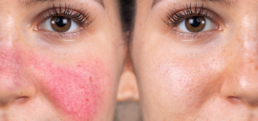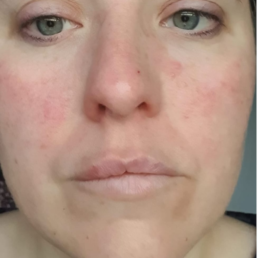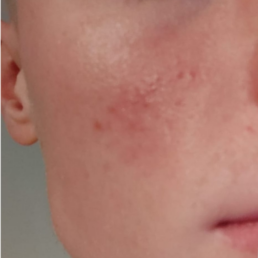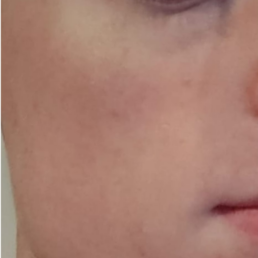
What is Rosacea?
Rosacea is a long-term skin condition that affects over 400 million people worldwide. It most often involves the central face (nose, cheeks, forehead, chin) but can also spread to the ears, neck, chest, and back, and causes redness, flusing, pimples and visible blood vessels. Both women and men of all skin colours can be affected but it is more commonly seen in women over 30 with lighter skin types.


After 1 month of using As A Lake am and pm, and The Perfect Cleanser.
What Causes Rosacea?
While rosacea affects millions of people, its exact cause is unknown, but it is thought to be cause by a combination of different factors. Existing studies indicate factors include:
- genetics
- immune reaction, such as an overactive immune system
- microorganisms
- stress
- environmental factors such as exposure to sunlight, wind or extreme temperatures
- certain foods and drink, such as spicy foods, alcohol or hot drinks
- neurovascular dysregulation


What Does Rosacea Look Like?
In addition to redness and flushing of the skin, there are a few other signs of rosacea that vary from person to person.
Skin affected by rosacea tends to be:
- small, red pimples
- visible blood vessels
- burning, itching, stinging sensation
- thickening of the skin on the nose (rhinophyma)
- tightness, tenderness and discomfort
How To Treat Rosacea
Rosacea is not contagious; there is currently no cure for rosacea however with a combination of lifestyle changes and topical treatments its appearance can be managed.
- Topical approaches such as prescription or calming creams containing Azelaic Acid, such as As A Lake
- Oral medications, such as antibiotics or anti-inflammatories
- Laser therapy
- IPL (intense pulsed light) therapy
Life style changes can also help to manage the appearance of rosacea, such as:
- avoid triggers, such as sunlight, wind, spicy foods and alcohol
- use gentle skincare
- wear sunscreen
- use appropriate skincare
FAQs About Rosacea
1. What is rosacea?
Rosacea is a long-term skin condition characterized by facial redness, pimples, visible blood vessels, and sometimes thickening of the skin. It primarily affects the central face.
2. Who gets rosacea?
Rosacea can affect anyone but is most common in women over 30 with lighter skin types. However, it can occur in both men and women of all ages and skin colours.
3. What triggers rosacea flare-ups?
Common triggers include sun exposure, hot weather, stress, spicy foods, alcohol, and hot drinks. Triggers can vary widely among individuals.
4. Is rosacea contagious?
No, rosacea is not contagious. It cannot be spread from person to person through direct or indirect contact.
5. Can rosacea be cured?
There is currently no cure for rosacea, but its symptoms can be managed and controlled with treatment and lifestyle adjustments.
6. What treatments are available for rosacea?
Treatments include topical medications, oral antibiotics, laser therapy, IPL (Intense Pulsed Light) therapy, and lifestyle changes to avoid known triggers.
7. How can I identify my rosacea triggers?
Keeping a diary of your flare-ups and noting any associated activities, foods, or environmental factors can help identify your personal triggers.
8. Is sunscreen important for people with rosacea?
Yes, using a broad-spectrum sunscreen with an SPF of 30 or higher every day can help manage rosacea, as sun exposure is a common trigger.
9. Can diet affect rosacea?
Yes, certain foods and beverages, especially spicy foods and alcohol, can trigger rosacea flare-ups in some people.
10. How does rosacea affect the eyes?
Rosacea can affect the eyes, leading to symptoms like dryness, irritation, and swollen, red eyelids, a condition known as ocular rosacea.
11. Can stress cause rosacea?
While stress does not cause rosacea, it can trigger flare-ups or worsen existing symptoms in some individuals.
12. What skincare products should I use if I have rosacea?
Look for gentle, non-irritating skincare products labelled as suitable for sensitive skin or specifically formulated for rosacea-prone skin. Avoid products with alcohol, fragrances, and other known irritants.
Recent Posts
- Celebrating Father’s Day and Enhancing Male Skin Health
- Peel Season: Home Hacks vs Professional Treatments
- Beauty Insider 101 Podcast
- Glutathione + Skin During Menopause
- What’s The Difference Between The Perfect Peel and Superblend?
- Rosacea
- Unlocking the Power of Vitamin C for Acne: A Guide to Clearer Skin
- Post Inflammatory Hyperpigmentation
- Acetyl Hexapeptide-8
- Melasma & Chemical Peels
- Ferulic Acid
- How To Get Rid Of Bacne
- Skin Barrier Repair
- Chemical Peel Before and After for Acne
- Dark Armpit Treatment
Find a Perfect Peel Trained Professional / Clinic Near You
To find your nearest clinic offering The Perfect Peel, visit our clinics page.
